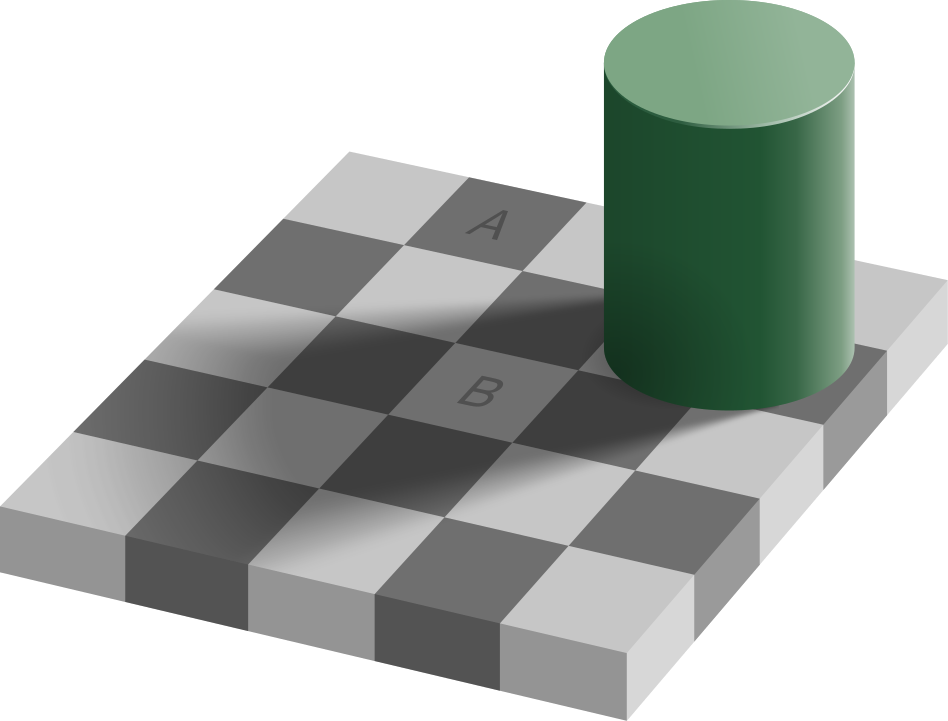
Reliable (safe system) decision making and policy making
It is easy for people to be misled and then become convinced that they are right.


Although it is hard to believe, the squares marked A and B in the optical illusion [1] are
Things that appear to be obvious are not necessarily true.
actually the same shade of grey!
Things that appear to be obvious are not necessarily true.
Poor decision making is a major factor causing climate change (and many other global problems).
- people are fallible and are prone to making mistakes of many different kinds
- good decision making and good policy making are difficult
- determined efforts are needed to avoid errors.
Fallacies and cognitive biases currently dominate opinions and public policy making
The current process of making public policy (such as how to stop climate change) is failing.Current methods give different answers to the same question e.g. how much investment should be put into cycling. Which policy is correct is hardly ever discussed by those in positions of power.
Scientific methods have been developed to avoid errors and give correct answers to complex questions
The essence of scientific methods is that they give correct answers to questions that we feel have correct answers.We have confidence that they work because of our experience that (a) they give consistent answers, and (b) they make accurate predictions.
Some key points of scientific methods are
- absolute honesty and zero tolerance of dishonesty
- treating each other with respect
- giving sources for all contentious statements so that the statements can be checked, and the evidence base is shared
- working together to resolve uncertainties and disagreements
- being open to scrutiny and challenge, and answering any challenge to the satisfaction of any reasonable challenger
- working towards a scientific consensus, i.e. a robust evidence-based consensus, i.e. one that has withstood scrutiny
- distinguishing between giving an unchecked personal opinion (by "I think...") and reporting the scientific consensus.
Examples of procedures aimed to avoid errors are
- double-entry data entry
- expecting independent verification
- giving the methods of a scientific study with sufficient detail to enable replication of the study
- pre-publication scrutiny via peer review
- post-publication scrutiny via publication of letters to the editor
- retraction of faulty publications
- development and guarding of reputations so that individuals and groups come to be regarded as 'reputable' or 'trusted sources'.
Scientific methods are needed in policy making in climate change and other major problems
The use is currently common within the medical and associated professions, but needs to be extended.Nicholas Maxwell (philosopher of science) has argued that humanity needs to "learn how to resolve its conflicts and problems of living in more just, cooperatively rational ways than at present" [2].
It seems clear that applying scientific methods to decision making more extensively would improve them enormously.
Decision making should be science-based, not just evidence-based
There has been a move to advocate "evidence-based decision making", but poorly trained or unscrupulous politicians can just select a piece of evidence that fits with what they have decided to do, and claim that their decision is evidence-based.All policy making should be science-based
If the process is fixed, the correct decisions will be made.The immediate goal should be to make campaigning science-based
There is a need for- consistent and accurate policy decisions
- campaigners to set the standard that those in positions of power should follow
- a minimum quality standard on policy making to be agreed
- identify and challenge fallacies
- avoiding inadvertent repetition of fallacies
Progress towards making climate policies science-based
Organisations taking a science-based approach are- the youth climate activists
- Scientist for Global Responsibility and their Science Oath for the Climate [3]
- Extinction Rebellion
References
| [1] | Edward H. Adelson: Checker shadow illusion https://en.wikiversity.org/wiki/File:Checker_shadow_illusion.svg |
| [2] | Nicholas Maxwell What went wrong? https://www.ucl.ac.uk/friends-of-wisdom/what-went-wrong |
| [3] | Scientists for Global Responsibility Science Oath for the Climate https://www.sgr.org.uk/projects/science-oath-climate-text-and-signing |
First published: 16 Jan 2022

 ✖
✖